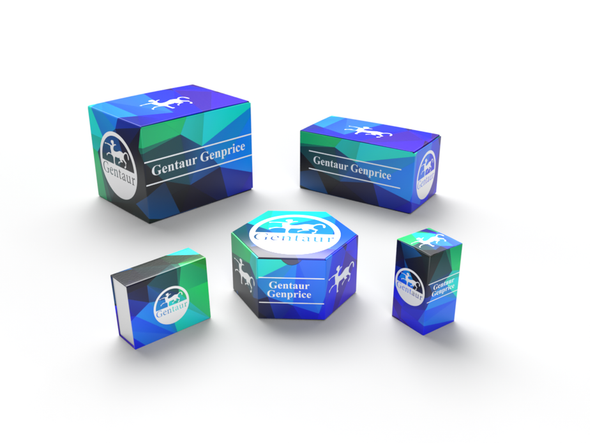Description
EndoG Antibody [7F2G10] | PM-4583 | Gentaur UK, US & Europe Distribution
Host: Mouse
Reactivity: Human, Rat
Homology: N/A
Immunogen: Recombinant protein corresponding to amino acids 51 - 140 of human EndoG.
Research Area: Apoptosis
Tested Application: E, WB
Application: EndoG monoclonal monoclonal antibody can be used for detection of EndoG by Western blot at 5 - 10 μg/mL.
Antibody validated: Western Blot in human samples. All other applications and species not yet tested.
Specificiy: N/A
Positive Control 1: Cat. No. 1211 - HepG2 Cell Lysate
Positive Control 2: Cat. No. 95-103 - EndoG Recombinant Protein
Positive Control 3: N/A
Positive Control 4: N/A
Positive Control 5: N/A
Positive Control 6: N/A
Molecular Weight: N/A
Validation: N/A
Isoform: N/A
Purification: EndoG Monoclonal Antibody is Protein A purified.
Clonality: Monoclonal
Clone: 7F2G10
Isotype: IgG1
Conjugate: Unconjugated
Physical State: Liquid
Buffer: EndoG Monoclonal Antibody is supplied in PBS containing 0.02% sodium azide.
Concentration: 1 mg/mL
Storage Condition: EndoG monoclonal antibody can be stored at -20˚C, stable for one year.
Alternate Name: EndoG Antibody [7F2G10] : Endo G
User Note: Optimal dilutions for each application to be determined by the researcher.
BACKGROUND: EndoG Monoclonal Antibody: The fragmentation of nuclear DNA is a hallmark of apoptotic cell death. The activities of caspase and nuclease are involved in the DNA fragmentation. Caspase-activated deoxyribonuclease (CAD) , also termed DNA fragmentation factor (DFF40) , is one such nuclease, and is capable of inducing DNA fragmentation and chromatin condensation after cleavage by caspase-3 of its inhibitor ICAD/DFF45. Caspase and CAD independent DNA fragmentation also exists. Recent studies demonstrated that another nuclease, endonuclease G (EndoG) , is specifically activated by apoptotic stimuli and is able to induce nucleosomal fragmentation of DNA independently of caspase and DFF/CAD. EndoG is a mitochondrion-specific nuclease that translocates to the nucleus and cleaves chromatin DNA during apoptosis. The homologue of mammalian EndoG is the first mitochondrial protein identified to be involved in apoptosis in C. elegans. EndoG also cleaves DNA in vitro.

![EndoG Antibody [7F2G10] EndoG Antibody [7F2G10]](https://cdn11.bigcommerce.com/s-1rdwiq712m/images/stencil/608x608/products/460831/466660/gentaur-genprice__26005.1661610467__29809.1661628092__75433.1661676199__77988.1661684280__64362.1661692443__02085.1662049603__45075.1662119302__91744.1662191540__21580.1662291419__52038.1663494778.png?c=1)
![EndoG Antibody [7G1C10] EndoG Antibody [7G1C10]](https://cdn11.bigcommerce.com/s-1rdwiq712m/images/stencil/590x590/products/460828/466657/gentaur-genprice__26005.1661610467__29809.1661628092__75433.1661676199__77988.1661684280__64362.1661692443__02085.1662049603__45075.1662119302__91744.1662191540__21580.1662291419__04031.1663494777.png?c=1)
![EndoG Antibody [7F2D7] EndoG Antibody [7F2D7]](https://cdn11.bigcommerce.com/s-1rdwiq712m/images/stencil/590x590/products/460830/466659/gentaur-genprice__26005.1661610467__29809.1661628092__75433.1661676199__77988.1661684280__64362.1661692443__02085.1662049603__45075.1662119302__91744.1662191540__21580.1662291419__53639.1663494778.png?c=1)
![EndoG Antibody [7G1G10] EndoG Antibody [7G1G10]](https://cdn11.bigcommerce.com/s-1rdwiq712m/images/stencil/590x590/products/460829/466658/gentaur-genprice__26005.1661610467__29809.1661628092__75433.1661676199__77988.1661684280__64362.1661692443__02085.1662049603__45075.1662119302__91744.1662191540__21580.1662291419__00751.1663494777.png?c=1)

